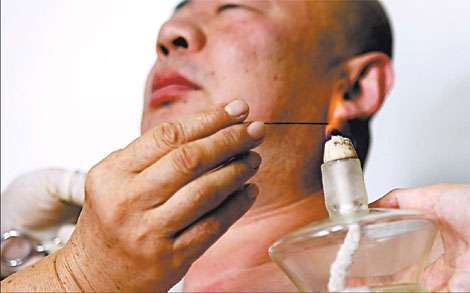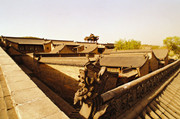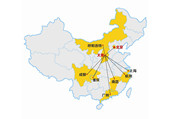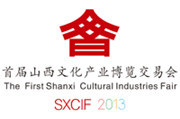Fiery art of traditional healing
By Ho Manli ( China Daily )
Updated: 2012-08-28
|
Dr Bai Yulan treats 47-year-old Shi Zhenyou with a fire needle after a stroke affected his speaking ability. Photos by Huo Yan |
When Sun Bicai's sons wheeled him into Dr Bai Yulan's clinic one recent morning, he could barely move. The 75-year-old farmer from Shanxi province had been operated on for a malignant gastrointestinal tumor. He was bloated and had not moved his bowels for 10 days.
After a detailed examination, Dr Bai had a student scrape Sun's back and then treated him with acupuncture needles. The old man lay prone without uttering a sound. That afternoon, he had two bowel movements. The bloating was relieved and he was able to eat a small bowl of noodles.
The next day, he reappeared and, with the aid of his sons, walked into the doctor's office.
At 66, Bai Yulan is one of Beijing's most renowned practitioners of traditional Chinese medicine. Formerly chief of the acupuncture department at Beijing's Sino-Japanese Friendship Hospital, she is a formidable woman with a black bobb and a no-nonsense air. She specializes in treating complicated musculoskeletal, neurological, digestive and respiratory conditions including kidney stones, asthma, aphasia, chronic insomnia, Parkinson's disease and facial paralysis.
A native of Penglai in Shandong province, Bai first learned traditional Chinese medicine at the feet of her maternal grandfather. Her 40-year-old daughter Li Hong, who is currently assigned to the Special Services Section for the Olympics at the Sino-Japanese Hospital, is carrying on the family tradition.
"Our family has developed special treatments that are all our own," Bai said. She has also invented her own methods, such as "fire needle with push therapy", which is especially effective for musculoskeletal problems, including curvature of the spine and bone spurs.
"My grandfather could get rid of bone spurs (with the fire needles), but couldn't solve disc problems or curvature of the spine," Bai said. She has learned to do so.
The treatment is painful, however. Liu Yongchun, a 52-year-old retired carpet worker from Beijing, suffered with a herniated disc for a year before she finally came to Bai.
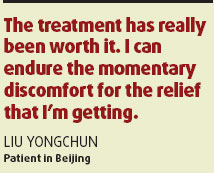
Standing behind Liu, Bai heated a thick needle until it was red hot and then inserted it into Liu's lower back. With a latex-covered forefinger, she pushed rhythmically against the spinal area where she has just inserted the needle. Liu exhaled with a loud "Hunh!" with each push.
"I was afraid of the pain from the needles, so I didn't dare come until I couldn't stand, sit or walk without pain in my hips and buttocks," the tall, matronly Liu said. "The treatment has really been worth it. I can endure the momentary discomfort for the relief that I'm getting."
When 12-year-old Zhang Yujie began treatment for curvature of the spine, she had been wearing a brace that enclosed her entire torso for 20 hours a day.
"The doctors said she would have to wear this brace until she stopped growing at 18 or 19 years old," said Jin Chunli, her mother. "When the weather got warm, it started to chafe her. My brother had come to Dr Bai and saw her treat this condition, so I brought Yujie."
The voluble middle school student was 3 cm taller after the first treatment. After 10 treatments, her spine had straightened so much that she had gained 8 cm - from 1.55 m to 1.63 m.
Ma Lifeng, 35, came to Bai after a CT scan and x-rays failed to show the reason for blood in his urine. Bai told him to get a color ultrasound, which revealed that he had three kidney stones. After three acupuncture treatments, which Ma described as "very painful", he passed two kidney stones. Bai keeps the larger one in one of the drawers on top of her desk.
"I'm very happy when kidney stones come out," Bai said. "The treatment for kidney stones is 100 percent successful."
Another condition that Bai has treated with success is facial paralysis. Her patients range from a 5-year-old girl to a woman in her 70s. One day recently, Bai lined up 5-year-old Lele and 16-year-old Lulu and took them through a series of facial expressions to check on their progress.
"Scowl", she told them as she examined their faces closely. "Look up. Wink. Purse your lips. Blow up your cheeks. Grin."
The acupuncture treatment followed. The high school girl sat stoically while the doctor inserted needles into the back of her neck, the top of her head, the sides of her face, her eyelid, and the area under her eyes, until she looked like a porcupine.
When it came to Lele's turn, she screamed and cried during the treatment, squirming and clutching her dress as her grandmother held her. The little girl had had a bit of a setback because after each treatment, her well-meaning grandmother would pull and massage her face.
"You mustn't do that!" Bai admonished. "I've already straightened her face, so don't manipulate it any more! I thought it strange that her other eyelid started to droop."
On alternate days, Lulu is undergoing treatment for weight loss. She has already lost 37 cm around her waist.
New mother Kong Xiaojing, 37, has lost 21 cm around her midriff after four treatments.
"I'm breastfeeding, so I am not able to diet. My stomach is much flatter now and my hips are smaller," Kong said, as her stomach, which was bristling with 16 cm long acupuncture needles attached to electrodes, was tightly wrapped in neoprene bandages.
The weight loss treatment is so effective that one of Bai's students, Kim Young Sung, used it to fit into a tuxedo for his wedding.
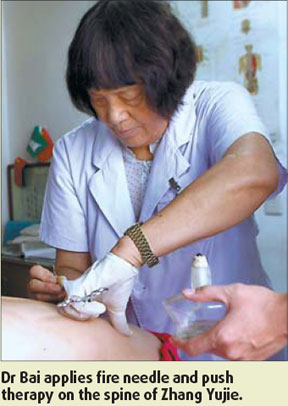
Kim, 31, is one of three Korean students studying with Bai. Another Korean, Yoon Jiyoung, 24, has been with Bai for three years and just graduated from the Beijing University of Chinese Medicine. The third, Jeong Hwa Gyo, 30, met Bai when he walked in the wrong door on his way to a Chinese massage class and was so impressed that he became her student.
"She is the best," Jeong said. "Her success rate is very high. That's why I want to learn from her."
Bai's only current Chinese student is Wang Yayun, 23, who graduated from Guiyang Traditional Chinese Medicine Institute in Guizhou last year. She came to Beijing to study under Bai because, she said Bai's "medical skills are exceptional."
Bai speaks fluent Korean and, according to her curriculum vitae, graduated from Pyongyang Comprehensive Medical University in 1966 with a degree in Chinese and Western medicine. She won several awards for her treatment methods while in Pyongyang, but will not talk about that period.
After returning to Beijing in 1988, Bai joined the staff of the Sino-Japanese Friendship Hospital and later became chief of the acupuncture department. She is also a professor at the Beijing University of Chinese Medicine and has taught students from 30 countries.
Bai can be brusque with both students and patients, but her manner belies a soft heart. She rarely turns away a seriously ill patient, and the number of patients at her door is often overwhelming.
She often gives a break to those in need. Recently, a 16-year-old high school student from rural Jingzhou, in Hubei province, came with her mother, a migrant worker, for treatment for bedwetting. The family had sought in vain for a cure, both at home and in Guangzhou. Finally the urology department at the Sino-Japanese Hospital sent the girl to Bai, who treated her successfully.
In gratitude, the mother attempted to slip a red envelope containing 500 yuan ($73) into the doctor's hand. Bai refused, saying, "Why are you doing this? I've given you a discount already!"
In April, Shi Zhenyou suffered a stroke that affected his ability to speak. Surrounded by her students, Bai tested the 47-year-old Shi's ability to pronounce monosyllables and to identify objects.
"La, la, la", the doctor said.
"Ba, ba, ba," Shi replied.
"What's this?" Bai said, holding up a pair of reading glasses.
"Lighter" said Shi, repeating what had been shown to him just before.
While Shi's wife held his head, Bai inserted a fire needle into the soft tissue under his tongue. Shi howled in pain, as the other patients in the clinic turned their heads away.
"Count!" Bai ordered after the treatment.
"One, two, three, four, five, six, seven, eight, nine, ten," Shi said clearly, without slurring.
Sun Bicai, the farmer from Shanxi, continued to improve. The third time he came in for treatment, he was feeling much better. He was more alert, which meant he also felt the pain. As Bai inserted the needles into his back and then into his chest, the old man moaned.
"Stop moaning, old man! You're going to lose all the qi (life energy) that I've just replenished in you," Bai said as she inserted more needles.
(China Daily 08/27/2008 page19)
